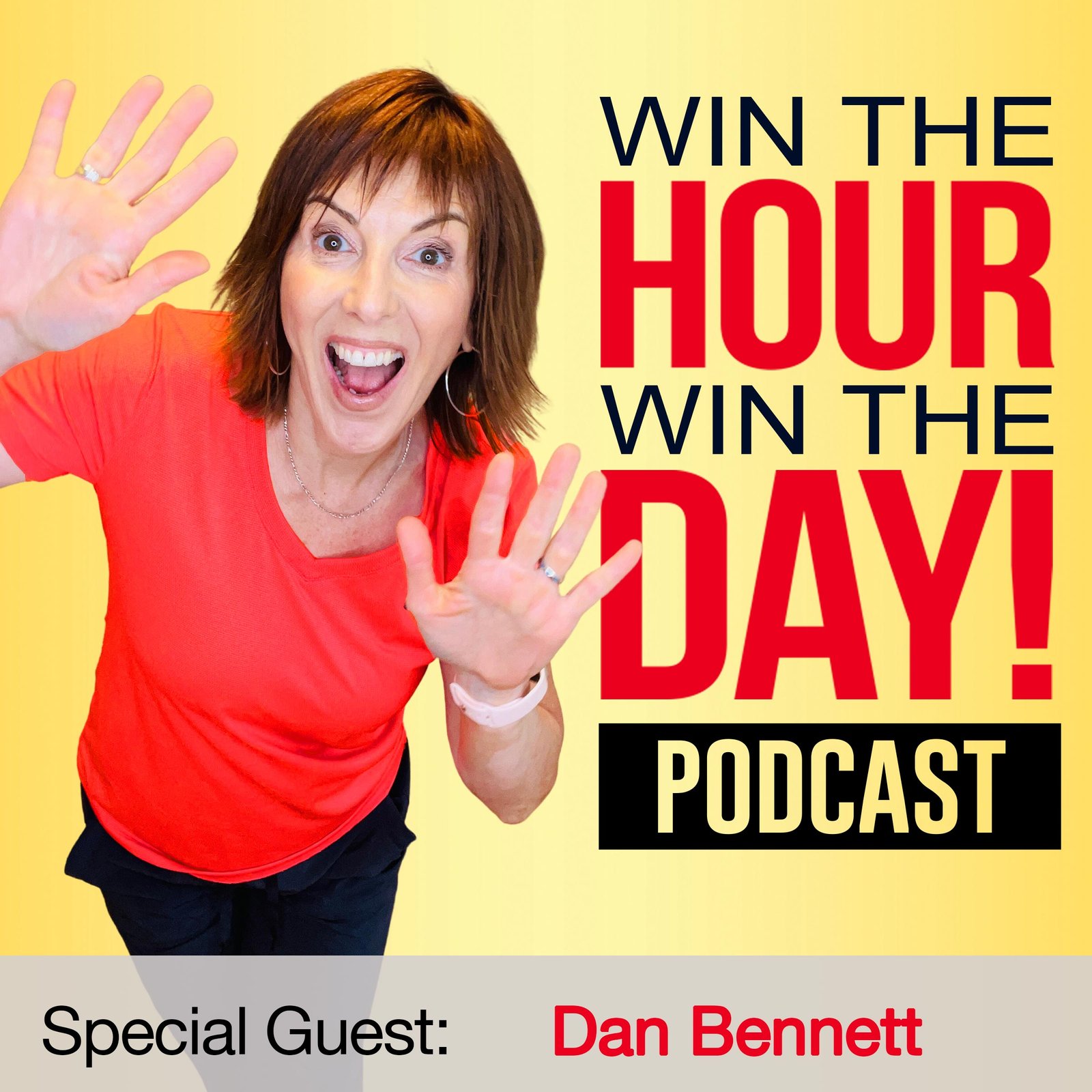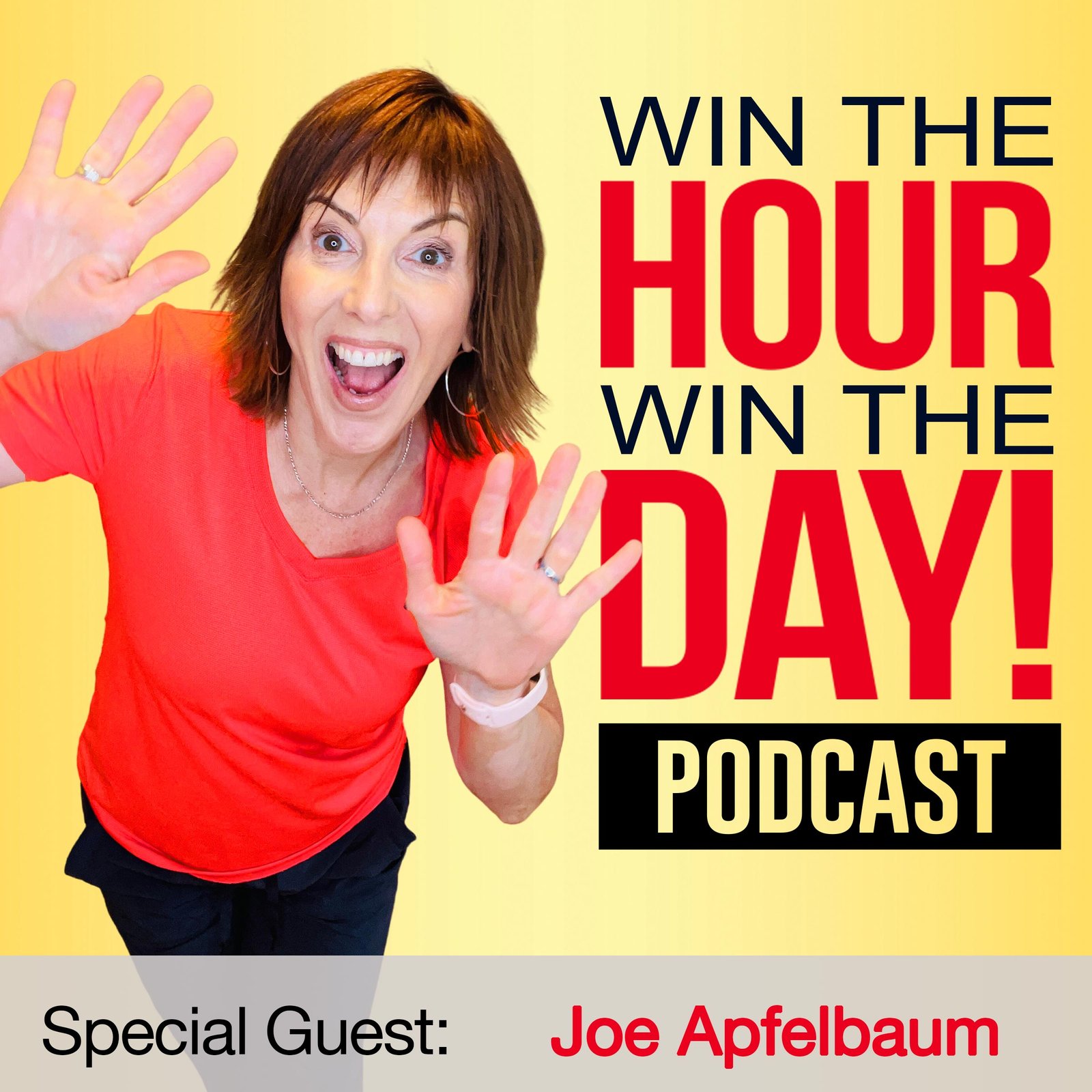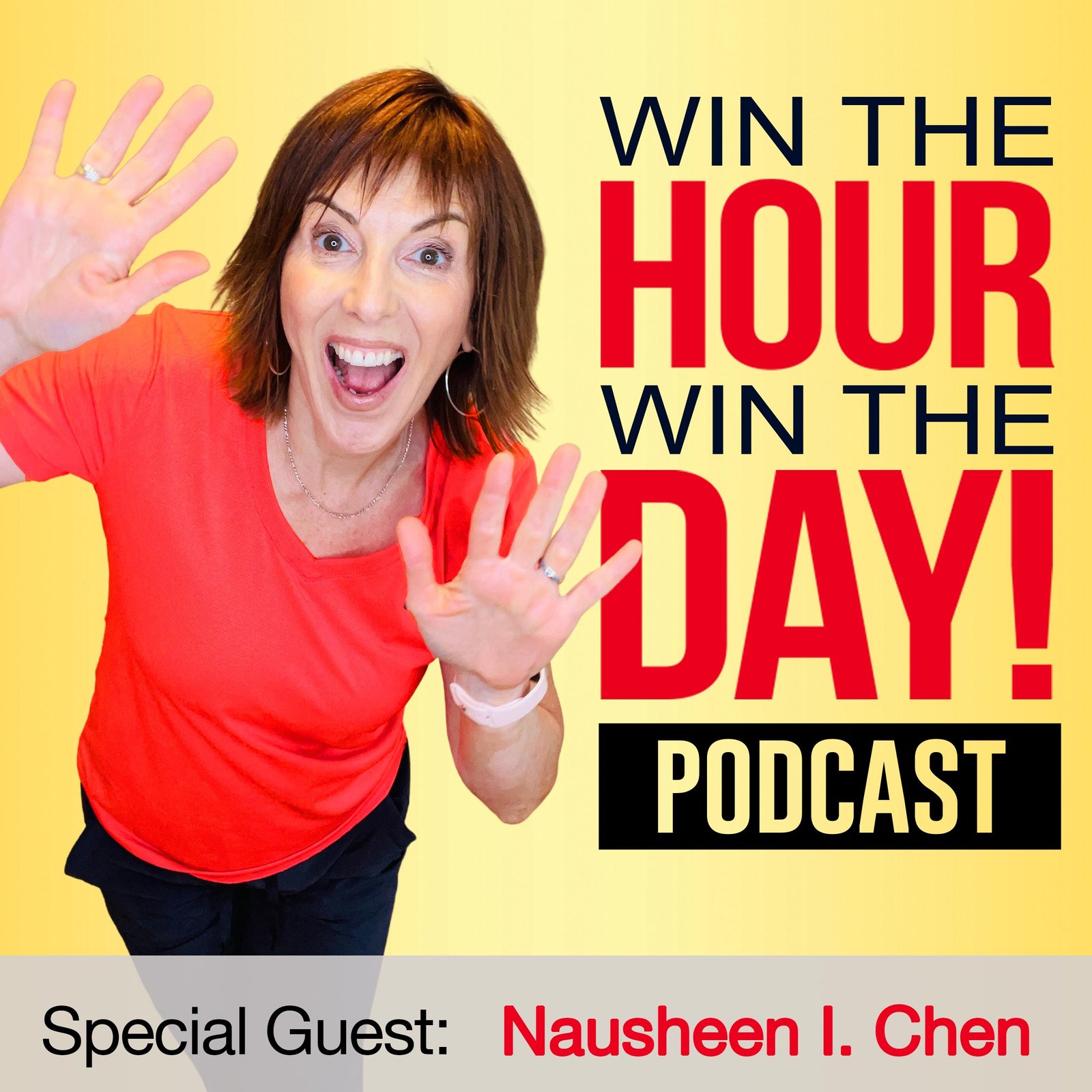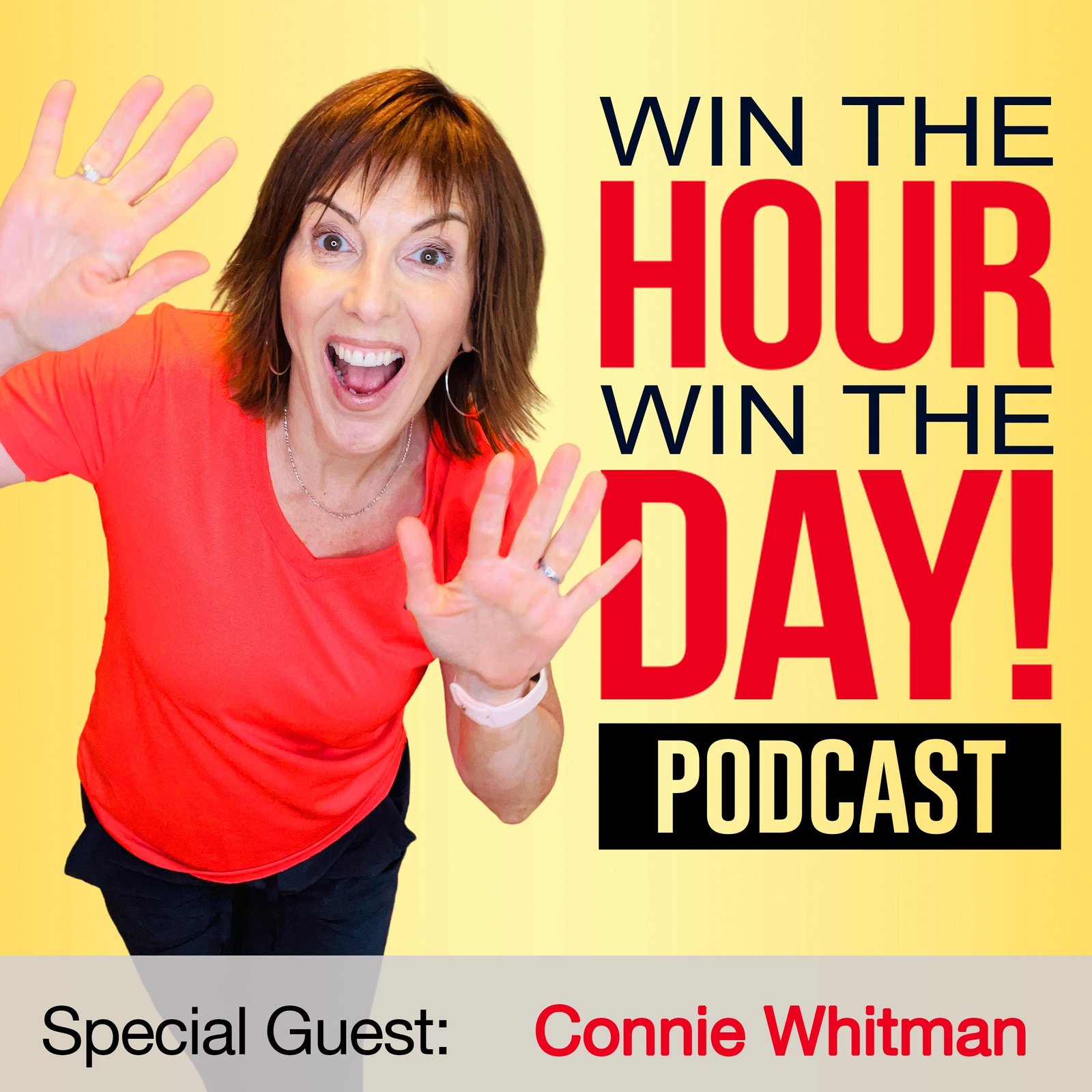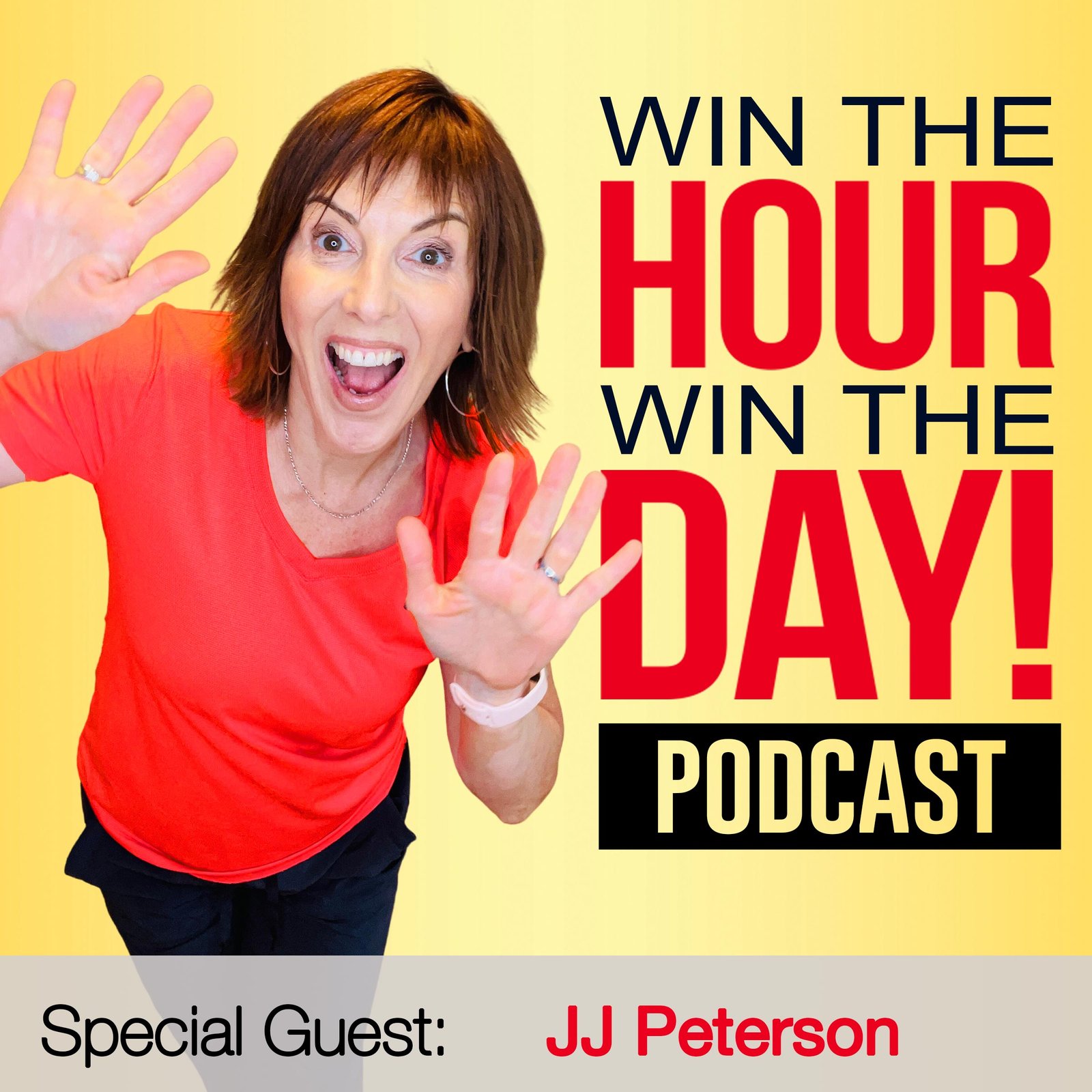Episode Summary This week’s episode of Win The Hour, Win The Day Podcast is...

Are You Ready For Your Next Big Win?
Know your entrepreneur personality and I’ll take it from there!
Recent Podcast Episodes
Preventing Burnout with Smart Work Tools! with Kris Ward
Episode Summary This week’s episode of Win The Hour, Win The Day Podcast is...
Master Social Selling: Heidi Medina’s Strategies for Engagement
Episode Summary This week’s episode of Win The Hour, Win The Day Podcast is...
Boost Productivity and Master Storytelling! with AmondaRose Igoe
Episode Summary This week’s episode of Win The Hour, Win The Day Podcast is...
Master Video Marketing: Top Tips for Entrepreneurs with Dan Bennett
Episode Summary This week’s episode of Win The Hour, Win The Day Podcast is...
Boost Your LinkedIn Strategy with AI Tools for Enhanced Productivity! with Joe Apfelbaum
Episode Summary This week’s episode of Win The Hour, Win The Day Podcast is...
Mastering Personal Branding with NLP Techniques! with Olesija Saue
Episode Summary This week’s episode of Win The Hour, Win The Day Podcast is...
Innovative Lead Generation and Email Automation Secrets with Jennie Wright
Episode Summary This week’s episode of Win The Hour, Win The Day Podcast is...
PR Strategies for Diverse Entrepreneurial Impact! with Jennifer Singh
Episode Summary This week’s episode of Win The Hour, Win The Day Podcast is...
Convert More Clients on LinkedIn with Richard Moore
Episode Summary This week’s episode of Win The Hour, Win The Day Podcast is...
Master Business Growth on Pinterest with Meagan Williamson
Episode Summary This week’s episode of Win The Hour, Win The Day Podcast is...
24/7 Sales Boost: Video Marketing Secrets with Alex Sheridan
Episode Summary This week’s episode of Win The Hour, Win The Day Podcast is...
Master Public Speaking Tips with Nausheen Chen!
Episode Summary This week’s episode of Win The Hour, Win The Day Podcast is...
Beating The Burnout With Connie Whitman’s Success Story
Episode Summary This week’s episode of Win The Hour, Win The Day Podcast interviews,...
Craft Your Social Media Content Strategy With Shannon McKinstrie
Episode Summary This week’s episode of Win The Hour, Win The Day Podcast is...
Boost Your Productivity with AI Tools: A Deep Dive with Erik Fisher
Episode Summary This week’s episode of Win The Hour, Win The Day Podcast is...
Boost Visibility: Repurpose Content and Leverage Podcasts With Christina Lenkowski
Episode Summary This week’s episode of Win The Hour, Win The Day Podcast is...
Master Personal Branding & Storytelling with Lisa McGuire
Episode Summary This week’s episode of Win The Hour, Win The Day Podcast is...
Boost Business on LinkedIn with Catherine B. Roy’s Strategies
Episode Summary This week’s episode of Win The Hour, Win The Day Podcast is...
Scale Your Business: Optimizing Virtual Assistant Services with Kris Ward & Rachel Eubanks
Episode Summary This week’s episode of Win The Hour, Win The Day Podcast is...
Affordable PR Mastery: Crystal Richard Unveils Modern Techniques
Episode Summary This week’s episode of Win The Hour, Win The Day Podcast is...
Mastering Business Storytelling with JJ Peterson’s Guide
Episode Summary This week’s episode of Win The Hour, Win The Day Podcast is...
Revamp Your About Page: Guide to Personal Branding
Episode Summary This week’s episode of Win The Hour, Win The Day Podcast is...
LinkedIn Mastery and Video Marketing Secrets with Alex Sheridan
Episode Summary This week’s episode of Win The Hour, Win The Day Podcast interviews,...
The Systems and Processes Playbook: Insider Secrets to Streamlining Your Small Business with Leah Abunales
Episode Summary This week’s episode of Win The Hour, Win The Day Podcast interviews,...
How To Brand Yourself Now in a Digital World! With Bob McIntosh
Episode Summary
Bob gives us the real deal. The bumps and lumps he learned on his journey. And some really great nuggets that can help our business Now. It’s a conversation that covers a lot in short time.
Learn:
– the biggest mistake you can make in your business
– the one thing that will improve your on line presence
– and how to brand you NOW!
Join The Community: https://www.facebook.com/groups/WinTheHourWinTheDay/
Win The Hour, Win The Day! www.winthehourwintheday.com
Podcast: Win The Hour, Win The Day Podcast
Facebook: https://www.facebook.com/winthehourwintheday/
LinkedIn: https://www.linkedin.com/company/win-the-hour-win-the-day-podcast
Bob can be reached at:
Website: www.TheBobMcIntosh.com
Facebook: facebook.com/thebobmcintosh
Instagram: @thebobmcintosh
What’s up everybody. Welcome to another great episode. So I am your host and today I have with me, my good friend, Kris ward, who we, uh, have known each other for about 10 years. We were just trying to figure that out, but pretty, pretty close to it. Uh, and she is a former photographer and now marketer and cause she kinda spun that into that.
She has her own amazing podcast called win the hour, win the day, which is also the title of your book. And I’m sure we’ll be talking a little bit about that later. Um, but the, the thing, one of the things that was really funny is I said she was a former photographer. And she did a marketing shoot for me. Um, like support my business way, way back, you know, when I was a very different Bob and one of the funny things that she said to me that still sticks with me to this day, whenever I’m doing a photo shoot and whatever, I am thinking about marketing or taking a picture of myself or Instagram or anything like that.
She said, you have to smile with your eyes, keep smiling and your eyes now, you know, why other models do cocaine? Yes, it’s funny because I literally I’m like I got to smell better. I got to talk about it. I need to compare, but, um, it’s, it’s a funny story. And it’s something that had stuck with me despite the fact that, you know, we don’t get to see each other all the time.
Um, but she is a bad ass entrepreneurs. I, a lot of really, really cool. Um, she’s from our sister country, Canada, a drop-in a, I cannot do it. And I’m very, very excited that she’s here. Um, like I said, she’s a, she’s a bad-ass in her own. Right. And so I think we have a lots of it.
Kris: Well, I’m, that sounds like a good intro to me.So I’m excited to be here.
Perfect. So for those who don’t know you, which I’m imagining is most everybody on this call, um, tell us a little bit about your journey, you know, kind of what you’re doing now and how you got there.
Kris: Well, boy, that’s a lot, so yeah, you’re right, Bob. I started out as a, as a photographer. Oh boy, that quickly grew into other things because it was really, I was working with business professionals, entrepreneurs. And so one thing led to the other and it’s your biggest marketing asset is your, is the photography. So, you know, I kind of outgrew that where the company grew and I needed someone then to do the photography for me, and I would direct the campaigns and that evolved.
And so then I would proudly call myself a marketing strategist after diving into that for a period of time. And then I guess where we took another term with when the hour, when the day. Um, you know, like so many entrepreneurs, I was working insane hours for a couple of years. Like, oh my heavens, as my husband always said, I was constantly stealing from sleep.
Right. I thought it was a warm and charming person, but you go months and months without sleep and that buffer of charms melt away. So the people that you’re supporting that are supporting you, you’re kind of snappy at them and that doesn’t work. So I thought, wow, I can’t do this for another 10 years. I was really exhausted and always just in pure fatigue mode, you know, so I thought, well, how can we do this differently?
So I started to really examine productivity and team building and just like with a. Feverish hunger for how do we make this different, this journey different. And, uh, you know, cause I, I got a lot done in a day, so I just kept thinking there was too much to get done because I was pretty organized. I got a lot of things done, but it was never enough.
So when I started looking at productivity and team building, I really went from 16 hours a day down to six. And what happened was I realized, oh my heavens, how hard I had been working against myself. I was so in my own way, Bob, I was running myself into the ground and I was so, so super hyper counterproductive.
It was unbelievable. So what a difference that made and things turned around for me, and I just couldn’t believe it. How much more effective. This was for me, my business, my health, my family, everything. And luckily it did because it was a couple of years after that, that my husband had been diagnosed with colon cancer.
I had been pulled away from the company for a couple of years. And when I returned after his passing, um, my company was not only, still alive. It was, it was not just surviving, but it was thriving. It was growing. My existing marketing, uh, clients had no idea of my absence. We didn’t feel it would be good for business.
We were very positive in nature. We didn’t really want to talk about it a lot. So it was a well kept compartmentalised issue and no one knew. And so they were just shocked. How did they pull that off? So they started to ask me under the capacity of, you know, team building and time management and productivity.
How did I swing? And so of course, having a fragility or appreciation for the fragility of life, I started working with them under that capacity because I believe your business should support your life, not consume it. And it is really the backbone to getting out of your own way. And, uh, that’s when the era, when the day was born and from that the book and, you know, we have a podcast as well, where we discuss general business and stuff like that.
But the real passion is having a business that supports your life instead of. And that’s so important.
I, you know, I know for myself, especially, I can find myself in that mode of just grind, grind, grind. It’s actually interesting. I’m in Austin, Texas right now. And I’ve been taking, making sure very poignantly picking time to I’m on weekends, um, primarily to explore the city.
Cause I was like, you know, Left to my own devices. I might find myself just like, you know, grinding away. Cause I don’t know about people here, that’s it, you know, it’s new it’s, you know, and I don’t have an existing friend base. It’s like pick me up to go do things. So it could be very easy to find myself in that space, but making a point not to is it’s huge.
So I want to ask you, you said something that I think, and by the way, for all of you listening right now, I think this is super important. This is why I’m excited that she’s. We get caught up in that grind mode that email, everyone says, grind, grind, grind. You got to work like crazy hours. Right. And don’t get me wrong.
Like I’m not going to say that there isn’t times when that needs to happen. But if it’s every single day, all the time, you know, for years there’s something wrong. And I think that’s what we can learn from Chris here. So I want to dive a little deeper in there. You said that you dropped from 16 hours to 6, that’s a huge difference.
Huge difference. So. What would be the, the biggest contributing factors to that for you or things that you changed that mindset? Or is it like, I’m curious?
Kris: Well, let’s be clear. Did not happen overnight. Okay.
well, to get that into play Monday and be having mastered by Tuesday. So it did not happen overnight, but there was a lot of things that I learned really quickly. Right. So, you know, for me, I learned the power of outsourcing and I just, you know, so many entrepreneurs. W we buy into that grinding thing.
You’re right. Bob. And that grinding thing, I look, I’ve never met an entrepreneur that needed to be told to keep going and the inspiration, all that stuff, like, you know, you got to work harder. That’s not, I don’t, I’ve just never met that entrepreneur. But what happens is you see all this stuff online and this beating your chest and, you know, bloody knuckles and grinding.
Yeah. Honestly, that’s just making a glory, glory of ill plan journey. That’s my belief. I believe what doesn’t kill you makes you really tired. Okay. So when you see this raw stuff online, that’s just somebody trying to get attention for what I call it. Ill plan, journey. So there is that aspect of it. And what I was doing was having to unlearn all these poor habits that I had bought into like, oh, this is how, this is how the big boys and girls do it.
Right. So I started to look at anything that I could really examine and make it a little bit more efficient. And, and, and we’re living in this magical time of outsourcing. That’s why I’m all about creating your wind team, your what is next team. But for me as a marketing strategy is at the top. Now I went online like many years before anybody else, because they just realize you can have back to back appointments on the computer.
You don’t even have to include 10 minutes for driving. You could show them your screen, blah, blah, blah. But like, but you know, nine years ago when I was still going to offices and I’d sit down. And I be making notes and I, all this stuff and marketing packages are very specific. And I would promise hand to God when I got to the car that you know this and I’ll make some notes, but Loblaw, when he get back to the office, this is fine.
I take my notes and he’ll go in the computer. It will be fine. And often what would happen is not this Friday, but next Friday, these notes would get into the computer. And then I got the opportunity to be one of two people. The first one was if they called. I know they could hear me scrambling and trying to put my notes together and figure out stuff.
Or I might misquote them because you know, these notes were meant for 20 minutes and offered two weeks and then it looked like I’m trying to swindle them, but I not, I’m just not prepared. So who wants that? So I hired someone to do transcriptions for me. What would happen is. Leave the office that, you know, my, my potential client’s office sit in the car, I would talk into my phone for like 30 seconds.
It would be up within hours. Now here’s the thing. Some weeks I had no meetings. Other weeks I had three or four hours of meetings, but because this transcription is it’s all she did. And all she liked to do, she was really, really good at it. So the weeks that I needed her for three or four hours cost me like 12 bucks.
And I was like, ah, I was always from the mindset of, if I do it myself, I’m saving money who can afford a team I’m kind of new, you know, I don’t, I’m not making enough money yet to start paying people full time. And like you are from the mindset of a background of an employee. So I was just always in my own way.So that’s how it started to unfold.
That’s perfect. That’s perfect. So, so you start plugging in. So the 16 hours is, and I wanted to clear some of it’s outsourcing other things that you needed to do, but just didn’t need necessarily to be done by you. It wasn’t just like, oh, I magically reorganize my day to eliminate 10 hours of work.
Kris: No, it took time and it was me chipping away, taking a look at everything I was doing.Because I was what I call myself now a recovering Russia holiday. So, what I was doing constantly was just go, go, go, trying to out on the clock, just go as fast as I can. And that does not give, lend itself to the opportunity of being more effective and more creative.
It’s just not how the science of the brain works. Right. So when you’re going full tilt ahead constantly, constantly, you know, you’re not getting more effective. You’re just going, you’re just a Russia Hollick. So I wasn’t examining anything. I wasn’t, you know, in any capacity of making things more efficient.
And I also had the governing mindset that if I did this myself, it would save me. Perfect. So what’s your mindset now, if it’s not to save money,, so my mindset now is really that what I teach all my coaching clients is I think for many entrepreneurs, you’re about in 80% of admin and what I call the web of admin.
Now I’m constantly looking. Yeah. You know, it should be 60% creation, 40% admit. Okay. So with my podcast, when the hour, when the day it’s all general business, it could be anything from sales, social media, whatever you’ve been on it. Bob spectacular guests, everyone should tune in, just listen to Bob. And right now, excuse me, we’re looking at doubling our output so that we’re going to do two shows a week, but we have finagled that so what’s going to happen is we will double our output, but our work is going to increase 12%.
All right. So 12% of an increase in work, but doubling our output. So it’s really about, because I don’t need it that podcast as much as we love it, we don’t need it consuming all our time because we have to get to the next thing we have to get to my second book. We, we need to constantly can be compressing and keeping the admin part 40% so we can be in the creation part 60%.
That’s perfect. That’s perfect. So what, what advice would you give to someone who’s like, okay, Chris, I like this, this idea sounds good. I can start chipping away at my day. Where do I start? What things do I start to think about chipping off to something?
Yeah, that’s a really great question. You know, it’s probably one of the most common questions we get on our website, www dot when the hour, when the day.com and what I would say is so many people think, okay, I’ll get a VA.
And then I will do a couple of things. I’ll just start dumping stuff from my desk to hurt us. And that’s just moving a pile of work, but it doesn’t really change the framework in which how you operate. Or worse. I call this pulling a, Chris is just say, oh, come in Sunday. And I’m going to work really hard and create all these systems.
So when I hired that new person she’ll have them, but what will happen is they’re not tested systems are going on memory. And the first time somebody goes through them, they’ll realize, oh yeah, this works. This works, but I don’t have the password for this. Or this happens on Tuesday, but not Wednesday. So, what I’d say is start small, start simple.
Okay. Now, when we do this, a big part of what we do with our coaching clients is we help you with the onboarding and the hiring and making sure everything’s in place so that when you do bring somebody on you’re ready. Cause that’s a big mistake. There’s a lot of agencies out there now that will say, oh, we’ve got outsources for you.
We’ve vetted them. And they give them to you and they may be great at what they do, but you’re, you may not be set up for them. And so they’re new to you and then you’re new to them. And then you don’t have an infrastructure. You know, really lends itself to getting work done. So now you find that more work.
So I don’t have time to do that. And it just all Peters out. So what I would say is some of the strategies are, you know, even when we’re working with a coaching client yeah. Go out and we hire somebody for them and they meet them before they’re officially hired. We teach them like, look, let’s start small.
She’s going to work five hours this week. Even if you want her full time, let’s get success there. Let’s get the infrastructure in play. And then we grow an effective infrastructure versus, you know what we call our super toolkit I mean, people talk about systems. They sound really boring and heavy that’s.
Cause you’re thinking of the mindset of corporate, where they were just put in play for liability and they weren’t meant to be tweaked made. User-friendly they’re usually written by somebody who didn’t do the job. So just start simple. Yeah. Just start simple and then start growing on that.
Perfect. And so. Is there a certain things that you feel like someone should look at outsourcing first, like in terms of actual activities, like, you know, or like I’ve always, for me personally, I’ve always gone by it. Like if I hate doing this, it’s the thing I want to outsource. Um, is that you think that’s a great way to go about it or is that, am I totally off base?
Kris: No, you’re never off baseball, but your show you’re always going to be right.
Here’s the thing I learned more from this show. I don’t, I, you know, to be honest, if you’re watching and listening, drop me a note, let me know you actually learn or find this helpful, even if no one else. I do something for myself, but I would love to know the other piece too. And I always like every single sharp one, at least one day, if not,
yeah, me too. I call them like free coaching sessions. I get these guests on. They teach me something it’s spectacular. So no, you’re not way off. I think that’s a wonderful philosophy, but I also think to be honest, Bob, that it takes some confidence. All right, you’ve got confidence. You got some sweat. So you are confident enough that you go, all right.
I don’t like doing this, so I’m confident that I could hire somebody to do it because I don’t want to do it for often. For most people. That’s a fear-based thing. Like I don’t like doing it. I I’m not doing it well, I have to learn how to figure that out first, before I hand it off to somebody else. So not everybody has your confidence.
What I would say to you is I think that we really truly live in a world of copy and paste, and there’s a lot of pre and post production work and I call it the 3d. You’re damaging overhead, diminished opportunity, delayed income. And so often, you know, you think I’m saving money. Like I thought and thinking, oh, this is, you know, but what it is, no matter what you sell, let’s keep it simple and say, you sell something, a package for a hundred bucks.
Now you’re doing this pre and post worker admin work, and now it’s a hundred bucks an hour. You’d never pay somebody to do that ever. Right. So what I say. You know it, depending what you’re doing really often, a VA is a great support. I think a big mistake, a lot of people make is they outsource to social media and they’re not clear.
There’ll be like, oh, I want somebody for social media. Well, what do you want? Do you want them writing the post? Do you want them to just posting your copy? Do you want them tweaking the pictures? Do you want them to know the backend? There’s a lot of components there now. I’m not suggesting you have five people for social media
But I am suggesting you need to be super clear on what you’re doing. That’s the big mistake is they just put this out there and then think, oh, I’ll just bring somebody in and they’ll clean up this hot mess and it doesn’t work like that. You’re in your own way again.
So you need, you need them to understand what your objective is and what you’re trying to accomplish with them, taking it over,
simplify your objective.
Okay, perfect. I think that’s no, that’s huge. Simplify your objective because if you don’t, I mean, 100% have been guilty of this. The in the past is like, yeah, like here’s, I just like, here it is. And they’re like, they, they get lost in the day-to-day of like the minutia of it, because for you it’s for me, at least in the simple right.
I already, cause I already have it all in my head that they don’t have any. And so there’s no way to easily download from my brain, which whenever that becomes a thing will be insane, but not yet
God help us. That isn’t big. That is a super as big as problem is that brain thing. Like you just know this and then nobody else knows it.
That is totally you getting in your own way. And that’s also what I call really that social media example is diluting. It is kind of back in the day when you had to hire an employee and you’re like, well, okay, they have to be local. And then. Maybe I want them to do video editing for my company, but I only maybe a five hours.
Well, who’s going to come to a part-time job or who am I going to get for five hours? Okay. So now I have to give them more work so I can get the hours up because they really need that help. But then you’re diluting the talent. They’re doing other things that they’re not good at. So when you’re hiring somebody for social media, You want to start small, you want to be clear and you want to expand on and lean into what they’re good at, where too many times people dilute that.
21
And they also think too, like, I get this a lot from my clients. Well, my business is different. Everybody says that. And what I want to do is, you know, share with you. One of my clients, she was a interior designer. She’s like, Chris, I walk into a room, I see stuff. I can’t describe it. You know, there’s nothing you can do here.
I’m like, okay. So we examined what she was doing and any sort of documentation or stuff or stuff. She sat down with the client when she first got there, we ripped it all apart. We looked at her average meeting was about two weeks. Well, we broke it all down and we realized there was pretty good work and post work that we could do that was administrative.
And she didn’t have to do it, even though it was about design, there was a formula for it. And we, we showed her where the formula and the patterns, cause there’s always patterns in what you do, even if you’re a brain surgeon, there’s patterns of behavior and what you do. So we got her appointments down to like 45 minutes, sometimes an hour.
It’s unbelievable. And it was because we took her work and we can Preston. So her creation mode was much bigger.
That’s huge. Let’s see. So let me ask you this. Um, I, I love kind of like breaking things down. I think that’s huge. One of the things I’ve, I’ve personally had struggles with him. And I know I’ve talked to a number of entrepreneurs, especially when they’re outsourcing and particularly to foreign countries is oftentimes the language barrier.
And, you know, even if you go someplace like themes where they generally speak English very, very well. Uh, there’s even like a, I don’t know if it’s like a cultural barrier, you know, one of the things I see is, oh, well you said to do exactly this and it wasn’t. Critical thinking outside. It’s like, Hey, I executed this single thing right here as is.
And sometimes they don’t think past that single task to what the impact of that task when we had, and other things. Um, so, and I, and again, this is something that I’ve heard, not just experienced myself or heard from other entrepreneurs. So how do you handle that when, when you’re, when you’re doing this? Because I think sometimes it’s going to create more work for you in the long run. Which could be fast.
Yeah. The interesting piece about that, Bob is both those symptoms you’re talking about. You do encounter in a local workforce, so, you know, I’m in Canada, you’re in the U S it’s a multicultural world. You definitely could have people come work for you that are new to the country, or have been here quite some time and have an accent or whatever, so that, you know, that that really kind of, I don’t want to say irrelevant, but that’s a common place, no matter where you hire from.
Secondly, I also. Yeah. Yeah. And I would also say too, is how you onboard them and train them and the culture. So we are very big in our onboarding process of educating people that this is a different place to work. We are hiring you to think there’s going to be things to processes follow, but we are hiring you because of your personality over your skillset.
And this is what we’re looking for. We’re looking for thinkers, we’re looking for ideas mostly. Businesses, especially in the bigger organizations and corporate, they are parentified. So here mommy’s in a bad mood. Daddy, the CEO’s cranky cause the company’s doing this or that, whatever. And you just little minions you’d grow around and you try to get stuff done, but you’re not taught or encouraged to raise your hand and do come up with these big, great ideas.
But you kind of like, you’re just staying in your lane and doing your job and then you, then you look at these people you’re bringing on and going, oh, it’s a cultural thing. Yes. The Philippines are known for being open. But I have Filipino people on my team and boy o boy, they keep me in shape and they bring fantastic ideas to the table and they will advocate for things that I say, well, I think we should do this way.
Well, let me show you why we shouldn’t. Oh, okay, great. So the joke is, I always say, I want to be the dumbest person in the room and weekly in our meetings. I say, well, good. I’m still the dumbest person in the room because that was a great idea. So it’s really about the infrastructure, which is what we talk a lot about with our coaching clients is the onboarding process and our super tool kits, and how to you do really need to make that part of your onboarding process.
And you need to meet it and say it and show it and lead it because that’s not just the Philippines that is most workplaces.
Perfect. So I want to go back to something you said, you mentioned culture, and I think that’s a huge part of it. You said, Hey, we want people to think and have ideas. What do you do to build your culture to someone who doesn’t know anything about your culture yet in terms of how do you, do you explain it to them?
Do you talk about it? Do you show it to them? Like what, what’s your process of that?
Yeah, I guess you’ve creating a filter for someone who goes, nah, that’s not, for me. I’m not looking for that kind of stuff. The hiring process. You’re not going to get somebody that says that’s not for me. That’s that kind of our stuff, because we’re going to eliminate that in the hiring process.
And then when we do that and we start to onboard them, we really see, we call it out and identify it. So they get a little video training, they get a right. Cheat sheet, we educate them and we say, this is very different than anywhere else you’ve worked before. This is what we’re looking for. Then when we have what we call our scrum or little scrum meetings, you know, he might say something, I’ll say they’ll try something and it didn’t work out.
And they’ll say, oh, I’m so sorry. I say, Hey, safety, your sorry’s for when you need it. Like, don’t just throw saris around. So I call them out on it and they will learn the other people on the team will say, yeah, it’s different here. You know, I would rather hear three bad ideas and get one out of them. Then not hear any ideas, like it’s really easy to edit versus create.
So they just see in the way that I lead, but we call them out on that a lot in the beginning and we encourage them and say, you know, here’s the. Um, today in our scrum meeting, our student, we have a student, you guys can all have students. Um, we’ve had about 30. Now this year alone, we’ve got about 800 hours of free labor, you know, free admin skill, high tech skills, graphic design stuff from local high schools.
And when they’re in grade 11, 12, now they got a lot of talent because they came into this world with a cell phone in their hand. So, yeah, so we’ve used them over the years or whatever. And so even Lee who’s been with us just a couple of weeks, but he had an onboarding process with us and stuff. I was about to end the meeting and I said, okay, and anybody questions?
Great, great meetings done. Let’s get out of here. And he goes, oh, excuse me, hold on. You asked me last week to do research on something and do a presentation for you. I said, oh, you’re right now. Lean news. Lee knew by our culture that he could not come back next week and say, oh, but Chris, you ended the meeting.
Our company rules, let’s say you had to get an email out, but you needed to pitch her from me. You can’t come back next week and say, you didn’t give me the picture. You have to keep coming to me until I put my hand up and say, I’m in the hospital. They’re not sure, but they think it’s internal bleeding. So I probably won’t get that to you today.
Like they have to be told really aggressively stop until they get that from me. It’s their job to manage me, not to me to manage them. But even Lee who’s only been here a couple of weeks. He knew that was on him to speak up and take charge of the situation. So he took charge and said, Nope, before it ends, this is what I need to show you.
It should take about 10 minutes. And I’m like, all right, totally yay for Lee. Right. So we really create a culture of hard and fast in the beginning of what we’re looking for. And frankly, once they see that, I mean, it they’re really inspired by it. It’s really exciting for them because they get to spread their wings and come up with ideas and contribute. They’re not order-takers.
That’s perfect. That’s perfect. So what are you doing to create, to create that for them before they even get to the interview? Like, is it a question like you. I’m just, I’m just curious. Cause like, you know, like for example, we have on our company, we have our core values on our website and I, first thing I do before anything is say, Hey, take a look at those and then tell me what you think about them.
Like, that’s a question that I’ll ask them before they even get any further. And nine times out of 10, someone will be like, oh yeah, they’re good. I’m like, clearly that wasn’t, you know, if you read them, you’d know you need to send it to be more than they’re good. Um, but I’m curious what other. You do to filter people out to find it though,
here’s the problem with your core values, Lots of people say things, but doing it and saying it are two different things, right? So you can say you believe in something, but are you going to inconvenience yourself to support that? Right. And also what’s your definition of that? So if I’m like, oh, I’m all about hearing ideas. And then they find two weeks in.
It’s like, oh wait, she’s in a good mood. You know what I mean? Like, what’s my definition. Yeah. So I do believe in what we call the, do they pass P A S S so I always hire personality over skillset because you can change it. You know, you can give them a skillset, but you can’t change a personality. We also talk about action.
So when I go to hire someone, there’s a couple of little tricks. I do. Like even when I invite them to the interview, I asked them to come respond to me. Email, it’s a new email address to let me know if they’re interested, will they be attending the interview? I look how quickly they respond, how they talk to me.
I give what we call little action steps to see how they take action. Then I talk about success in the interview. I’ll ask them what’s a success for them. It’s very telling when somebody defines what a success is for them, that you’d be surprised. The things that they tell you, right. And then last. And maybe least is their skillset.
So to me, there’s a little things that we put in play when we’re onboarding, because again, we onboard and hire for our coaching clients, and then we, we bring them to a meeting. We introduce them to you and you get the final say, but they go through a 12 step process before you get to meet. And the reason we do that is because we’re helping you with your super toolkits, getting your company all set up, getting your work compressed to like 40% admin.
So you can do 60% creation and you don’t have time for the learning curves of a new hire. So we do that for you. So it’s really a lot of is done in the pre-qualifying, but say you do things is very different than showing them. You mean it.
Right? I love that. So I’m curious what are, what are some bad examples and maybe a couple of good examples.Definitions of success by people, at least from your experience,
you know, people will tell you silly things. So what I really don’t really care what somebody does. I care about what they felt was behind it. Right. So, you know, somebody might say success. You know, what for me success was, I am, I’m still working somewhere else.
And this came up in the meeting and there was conflict. And normally I would just put my head down and it’s how they dealt with a problem in the workplace or a success for them was they addressed it in the meeting and said, just taking the hits. Um, that’s not how it happened. And, and they might say to me, that was a really big deal for me.
There was 10 people in the room and I, you know, I was a little bit nervous, but I was really proud of myself that what I didn’t want to do is leave nervous and beat myself up later for the rest of the day. So I don’t even care what the situation was. I liked the growth and their explanation of their journey.
So for me, the success is where they saw the growth. I think that’s very insightful when somebody tells you why that was a success for you. It’s really powerful. Right. So it’s really just listening to the subtext of the story has great meaning. I don’t care if somebody says I ran a 5k, that’s great.
Unless they said, look, you know what? I was kind of embarrassed about my body and then I didn’t even want to be in shorts, but I just said to heck with it. And there, you know, so it’s really, again, the Subutex. So it’s stuff like that that really tells you about the character of somebody. And I find that to be very.
That’s a hundred percent. I get it. I get it. It’s funny. My first job out of college, uh, did the interview. It was a phone interview and I like I’m like beforehand, like prepping all my knowledge for like what thing, you know, like the technology and all this. And literally there was not as no question about what I knew.
It was all. Tell me about a time in which this happened. You know, they, they would ask me to tell stories about situations that I was in. I remember going to get through an interview. That was the weirdest interview I’ve been on because I’d never been on an interview like that before every other interview I’ve been through, um, which had mostly been for large companies like fortune 500 tech companies.
They didn’t want you to think or a situation you want to say, can you do this? And can you execute this? And this order from us, it’s actually funny. The, my internship was with a fortune 500. And on my review sheet with the college, my boss had written, asks too many questions. I was like, that should have been my indication that I was probably not going to be well-suited for a corporate career.
Kris: I tell them to treat like they get paid for questions. I say, I want you to think, like you get paid extra for questions because the questions, tell me what they’re. That’s all, you know, they showed me their train of thought, right? It’s like, so then why there, somebody said once there’s I always say there’s no stupid questions, but somebody said there are no stupid questions, but there are stupid people asking questions.
So really from stage, because mostly I like someone will come up and say, oh, well I have a really stupid question. Or, or, you know, write down. I have a stupid question. Like, well, there are no stupid questions, but there are a lot of inquisitive idiots.
So I asked him too, because it really shows what they’re looking at. And then it’s often I feel shows what information I didn’t give or like, oh, that’s a great question. I can see how you totally are over there, but that’s not what I’m talking about. So I’m all about the question.
That’s perfect. That’s perfect. Interesting. It’s just funny how. Different. The worlds can be of, of, and especially, I think a lot of us, a lot of entrepreneurs, especially because if they’re not starting when they’re young and they started coming from that corporate direction, and a lot of times there’s not cultures like that.
So now you’re, you’re really trying to create something. That’s the opposite of what you do.
Yeah. And then we blame it on the poor Filipino culture, but I would argue, that’s not that that’s everywhere you, most of jobs are in a very parentified system and you are to stay in a lane to do work that was executed by somebody who doesn’t do the job or did it a long time ago.
And they, they’re not encouraged you to shake up the system and come up with ideas. And, oh, we tried that 10 years ago, whatever. Oh, he’s Joe from sales. He’s always doing like. You know what I mean? So it’s not just that it’s the mindset of an employee and how we were all brought into the workplace.
That’s perfect. So what, uh, you know, aside from just your own, your own book, what other books would you recommend for someone who’s wanting to learn about culture or are trying to create that culture? Because I would argue that a lot of the entrepreneurs that I’ve met and maybe even a lot of them that are listening to this show right now have either never thought about culture or if they have.
It’s in this context of, oh, when I’m big enough, I’ll get to that point. They don’t think about that. It starts with us.
Yeah. I mean, that’s a great question. I do know, and I say this, you know, not to brag, but people tell me all the time that we do this very differently than anybody out there. And I don’t know of a book that talks about culture, because what happens, culture is often associated with big organizations.
How could I have a culture that is mean a student and somebody else work in five hours, but you can’t fall into a healthy culture with 200 people when you don’t have that kind of team with three. Right. And so. You know, as I said to, even in the beginning of the hour, I talked about losing my husband. I mean, he truly was my best friend.
We were a great team. We had a lot of fun together and my team got me through that, but I showed up every day with everything I could in the beginning after losing him is I had a good excuse to show up and be somber or be whatever I want to be. But I was purposeful that I am responsible for the energy I bring into the room and they don’t need to be looking at my sad face every.
To the point that, you know, right before he passed away. I remember Evan who was, has been with us a couple of years. By that point. Now he’s been with us like seven years and I came in, I was trying to be positive because I was gonna, something came up and I was trying to explain to him and he said, so help me, God, Chris, if you come in here one more time and you put a positive spin on the most horrific story I’ve heard. He said, I can’t take it. My nerves are wrong. Like he said, He said, you gotta stop. You’re killing me. Cause this is so sad. So they were sad or nothing, and they were sadder than I was. They brought more sadness to work cause they knew him and stuff and I felt, you know, they, it’s not fair for them to go through the grieving process with me for a couple of years.
So I had to figure out how do I show up and give my best. And yes, acknowledged that there’s missing pieces here that I have to deal with, but, but it’s not going to be fun to work for somebody who’s sad for three years. So I’m not saying put a bandaid on it. And then I pretended to be someday it wasn’t, but I, I had to be really purposeful during that time of how I was going to lead.
And what was the culture of the company? So there’s always a reason, stress, finances, pandemic, whatever, but you have to lead and so that you can lean on them and so that they can be increased in mode. And so that they know they have that license to do it, not like, oh, well, she meant that before, but she’s been through a lot.
So let’s not bring up a new idea. So you have to be purposeful and deliberate.
I like that. That’s good. So what do you think makes your culture different? You said, you said a number of times that yours is just very different than any place. What are those items that you feel like. And why do you like,
well, I think that everyone keeps telling me in my coaching clients as well, when we teach them this stuff, that’s different for them.so I think the big things are, we, I am all about constantly being in the creation mode and that means the team as well. So I’m always looking at their work and saying, how can we compress your work? So it’s more and more efficient, so you can do more and more creation work instead of just doing redundant or repetitive tasks and say, okay, That person does and that’s handled. So I’m looking at how can we approve that? Because if you’re in creation mode, then it enhances me like recently, um, with our podcast, when they are, when the day we were all super excited that we were close to 200, five star reviews on iTunes and thought it was great. This is good news. We’ll make a banner and we’ll celebrate.
And then Ruby, my podcast manager came back to me cause we’re always tweaking, especially the podcasts where there’s so many moving parts and we’re going to double the output. She came back to me and she had found this place where she’s like Chris, there’s all these Stitcher reviews that we don’t know about.
And we have 905 star reviews over 900. And I was like, no, but. She has time in her creation and because podcasts still are kind of relatively not new, but they’re still, you know what I mean? It’s still, it’s a growing area. She’s constantly research. Yeah. She’s researching, she’s growing, she’s looking at stuff.
She’s joining groups, she’s taking things, she’s doing all this stuff and come back saying, okay, this is what’s happening. You can now be searched here. You can now. So she’s constantly in creation mode. So she brings stuff to us that we’re like, really, we can do that now. Are you kidding me? And these were 900 insanely thought out, detailed reviews that even reading them, I was like, oh, I want to print them and just wallpaper my walls with them.
So if she had just been a do this, get this done mode, she wouldn’t be bringing all these fantastic things to the table. So I’m all about having them in a bigger percentage of creation mode, as well as me. It’s not just about. And just teaching them to ask questions and just, it’s all about creation, creation, ideas to execution.That’s what being an entrepreneur is about.
I love it. I love it. Now, question for you. Do you meet with your team, you know, virtually via zoom, video call, whatever I’m like that basis, even if they’re outsourced. Cause I’ve I’ve. It’s interesting. I was on it. I think it was a training cause probably in August of last year and the guy said different points of view.
I might be saying he was wrong, but his point was VA’s don’t want to be on video calls with you. So don’t have video calls, don’t talk to them. Everything will be done through texts and only needs to be done that way. And I struggled with that. The idea of that, that seems like it would just be, it would create a disconnect between you and your team is how I would feel. But I’m curious what your take is on that.
There are a lot of people that don’t want to do that. Cause if they’re set up, but now with zoom and stuff, they can just have a background that covers their background, stuff like that. I will not have someone work for us that we can’t meet through video and they will also not be hired for one of my coaching clients, it really changes the world. When you look at their face and you see their face and you hear their laugh, it’s also more clarity, more conversation, more sense of team. So we it’s all virtual, whether they’re local, whatever, everybody hops on the zoom call, we have little scrum meetings.
So I, depending on what we’re working on, I have a scrum meeting, which is about 15 minutes, Monday to Thursday every morning. And then we have a team meeting once. Cause we go over stats and stuff.
You don’t know what a scrum meeting is. I do, but some of the here might not.
Yeah. It’s from a book. And it’s also about rugby that you get in a little scrum and it’s meant to be intense and short and also really, I also subscribed to other philosophies where if you’re having meeting, that’s long enough that you have to sit down and you’re not running your meeting well, so they’re just 15 minute meetings, but they’re really purposeful to highlight things and move stuff forward. It’s not like to go through some crazy agenda.
So we have little scrums Monday to Thursday, and then we have a team meeting where we go over a lot of stuff and stats and all these kinds of things about our podcast, social media at once a week. And it’s about a 40 minute meeting once a week with six people.
Yeah. That’s that’s, that’s uh, that’s like a world record right there.
Usually usually it’s like, oh, we need the agenda. Let’s have a meeting to talk about the metrics.
Yeah, no, no, we don’t do that. We do not mess around. Yeah.
Uh, they were like, oh, we’re going to do all these meetings. And it got to the point where literally I had eight hours of meetings a week and I said to them, I said, look, this is not productive. I don’t care that you read some books that told you that this is what it is. I’m going to straight up tell you right now that I’m in eight hours of meetings and six of those eight hours, I say the same thing.
Just different groups of people. And this doesn’t make sense. No, no, no, no. We gotta keep doing it. I was like, I’m not going to keep doing said, I’m not doing, I was like, I’ll do this one because this is important. This is like a top-down meeting. Everything else can go from there. And if people like we can record it and they can watch it, if you need to, or I don’t know something, but I’m not going to keep doing eight hours a week of meetings.
That’s insane. And I remember like in this particular case, It was just like everyone was feeling the same, but it was interesting. The culture, wasn’t the question, the cultural as well, this came from the top three. Therefore we must do it and don’t question it. And I just, I, to me, I’m like wha what it was to me that was mind blowing.
And so anyways, the point of the story is if you’re thinking about it, if you’re watching this. Are you creating that kind of methodology? Like, are you creating the space for you to be, you would do what I say and nothing else? Or are you creating an electric? What Chris has, where it’s like, Hey, I encourage questions.
I encourage people to drop in. And I would argue that for a small business, encouraging people to take ownership of things and question things is going to be more productive. Maybe more frustrating and it may hurt your ego a little bit more, but if you try and get the business, the bigger business you have, the more your ego should be happy.
My social media manager, just the other day, she sent me a thing that she saw online and she was showing me on LinkedIn, you have your name, Chris ward. And then you have when the hour, when the day underneath it, and she showed me a little clip and she said, look, people, here’s a new thing. You’re wasting everyone doesn’t care about your company name, put your name and what you do for them under that.
Oh, that’s a good tip. Okay. I did. I change it right away on LinkedIn. So she’s bringing this stuff to me. Hey, I just saw this and we’re not doing it. All right. I’m on it. It’s done. So I would’ve like, oh, look at my profile is quite nice. I wouldn’t have known to look for that, but she’s out there coming and bringing stuff to the table.Cause she’s in creation mode.
Yeah. And just looking at it from a different, yeah. I mean, I know heck a number of times I look at something and then someone’s like, how did you know that? I wouldn’t do it so many times. I don’t know that I’ve seen anything, no matter what you’re wearing. It was, yeah. Okay.
—————————
This, this has been great. Um, I could probably keep going for another hour, but, uh, I’ll be respectful of your time and our listeners’ time. Uh, so. Yeah. Who am I? My brain, literally. I’m like going through more questions, man, but it’s okay. Uh, where can people find more about you? I check out. I know you said your site was when the hour, when the day.com, if they want to get your book, like, what’s the best question when to go to Catholics.
Listen, Bob, I will always come back for you. So part two, just call me when we come back. Cause there is. I do think there’s a lot to dive in here and unpack. And I think the saddest thing about this, which is what breaks my heart is, people are working isolation and trying to do right by them and their family and stuff.
And this is why I’m so passionate about it is because you asked some phenomenal questions that people are just going on. The assumption that this is how it’s done. And it was done at their job, you know, in the last 20 years and stuff. And so how do they not know. They think they’re doing right and being a big boy or girl and following what was happening in the corporate world, but it’s not working.
And that’s why you left that. So I’m happy to come back at any time. Reach out to me in any of the socials. Say you heard me on this fantastic podcast. Send me a message on LinkedIn. Hey, you can even reach me. Cause a Bob on my personal email, Chris, K R I S w a R D Chris ward at when the hour, when the day.com.
Perfect. Perfect. So definitely everyone check that out and as always, thank you for dropping in giving us a listen, watching it wherever you’re checking out from. Truly appreciate it as always ask one small favor. If you liked this, or, you know, someone who was buying the idea, just share it. That’s all you got.
It takes nothing from the most amazing things that we have the power to today to do is impacted business simply by engaging with them, through sharing, through commenting, waiting, reading a review, whatever it is, not all that just takes a little bit of time, but I mean, it’s a huge impact and that’s the whole point of a systemic impact on people’s lives, their businesses and where they’re going.
Otherwise I’d just be having conversations for a second having conversations, but I love making impact at the same time. So, thank you so much for sharing rating, reviewing, subscribing, whatever it is, hit, the bells hit the buttons, things, do this stuff. You know what it is or wherever you are. I appreciate you all.
And we’ll see you on another great episode next week. Thanks so much, Chris. Appreciate having you DMC.
Perfect. Uh, let’s do the intro. What’s up everybody. Welcome to a great episode today. We have my good friend, Chris ward, and we dive into the culture of your business, how to do things the right way, the wrong way, the way that’s going to get things done, how she dropped from 16 hours a week of work to six, which is mindblowing.
I think you’re going to really, really enjoy this episode and I can’t wait for you to listen to it. Let’s drop in and see what she has to say. You said 60 hours a week to six hours. It’s a day. A day. Let me redo that. Yeah, yeah, yeah. Okay. Sorry. I just didn’t want to, no, no, that’s good. I’m not that good. I don’t work six hours a week.
Perfect. All right. What’s up, everybody? Let’s check out this. No, my brain is totally. Um, all right. What’s up everybody. Welcome to another great episode. I’m really excited to have my good friend Chris ward. Today. We talk about culture, how she was working 16 hours a day and dropped it to six. How you can build a team around yourself to do that thing.
And just lots of other, really, really great stuff. I truly believe if you were an entrepreneur, which you probably are. If you’re listening to this, you’re going to get a whole lot out of this episode. So let’s drop in and hear what she has to say.
Yeah.
Awesome. Thank you. That was really good. You did a good interview. I have to say now everyone has a microphone, but everyone has a microphone. Should. That’s what I was trying to say. Um, but you, uh, you did fantastic. I, you asked me questions that other people had never asked and I’ve been on a lot of shows, so I thought it was spectacular.
Yeah. Spectacular. Yeah. It’s interesting. I keep getting told that and it’s like, it’s like, nah, I’m like, I’m not that good. Really? Am I going to say it like it is, but the thing that I found interesting. Everyone I’ve had on so-called. I got literally I do. I learn things from them. And these are like questions that I’m asking if you like, or the ones that I get asked all the time or the ones that I have, or the experiences I have.
And it just seems like it’s been interesting because he will tell me, oh, like I was in the same thing. I was like, okay, good. That means you’re getting, are you out of my, of what I’m doing? And I’m just doing this for no reason. Yeah. A hundred percent. A hundred percent. Absolutely. Well, I have to hop on another call, but, um, yes.
Any reason you figure out a reason to bring them back? I had a spectacular time. I thought, you know what to be? Yeah. I knew you’d be good and I trusted you and all this other stuff, and you’re great, but almost like, cause we are, you know, you are a little business buddy. You are my friend. I almost like didn’t I almost, I guess I feel like, you know what, I’m up to all the time.
So I didn’t know the questions would be that good. You know what I mean? Because, because it’s like, ah, you kind of know what I’m doing. How, how interested could you be in what I’m doing? You know what I mean? So you really did spectacular Taylor. It was really good. Really great. I appreciate it. By the way, you’ll get an email.
Uh, with a link, um, a Google drive link, and also have the podcast link and a YouTube link to drive. They’ll have a sheet. So she’ll edit this into a Facebook posts, Instagram post stories, the full episode, the download on video and audio for whatever, whenever you need it for whatever, how, if you want to share.
But not there, obviously. You’re welcome to do whatever you want with it, but, um, well, definitely promote it, but also more so than other ones. I’m definitely gonna make sure it’s on there. We’re just doing better with our YouTube channel now, but I’m going to do that because you asked me a question somebody else did.
So that’s going to put it ahead of like, it’s going to be highlighted so fantastic. Well, I’m taking all your time and again, had a meeting. It’s good to see you. Yeah, it’s good to see you. All right. We’ll talk soon. Thanks so much, Bob. Bye.





